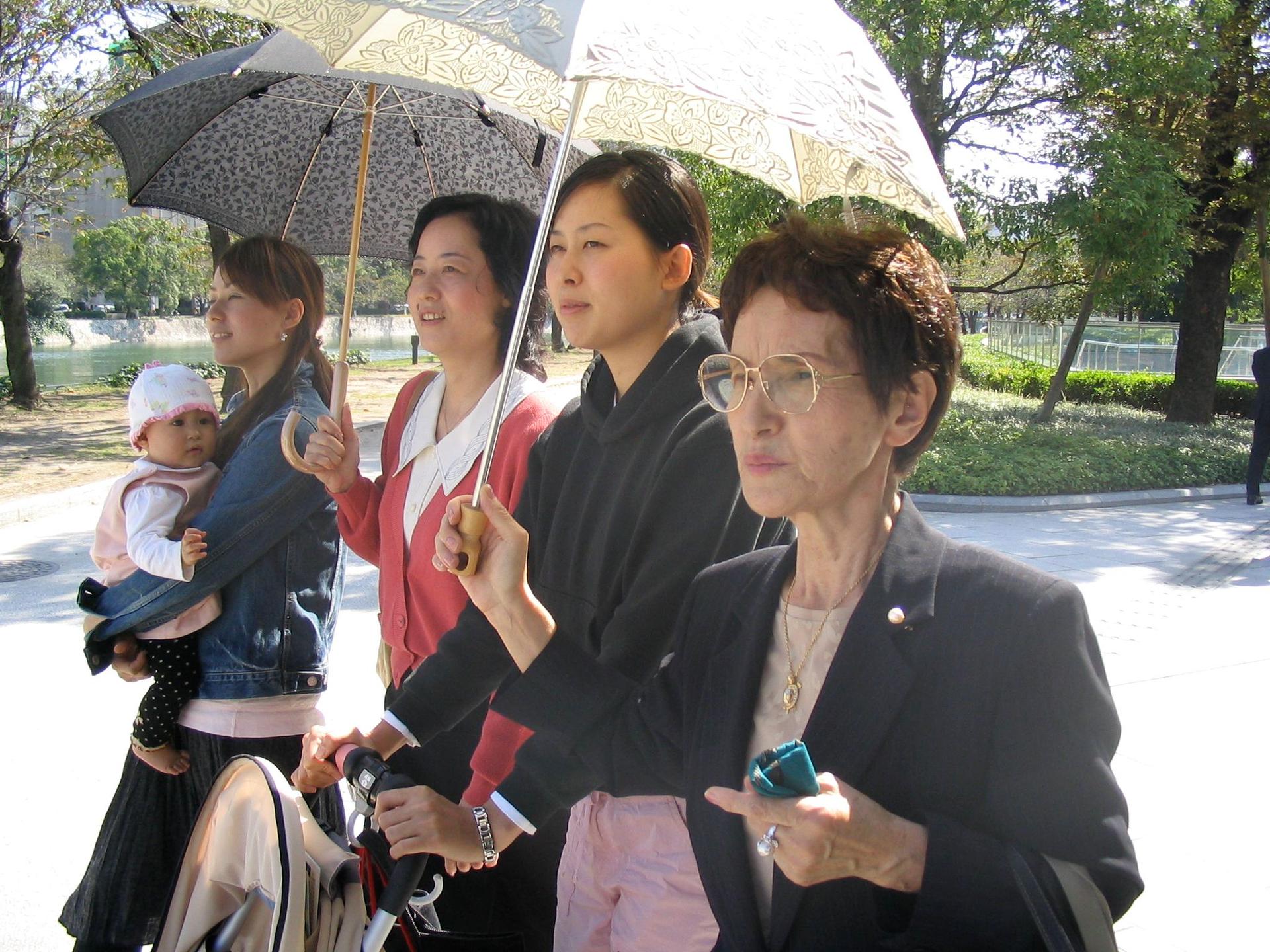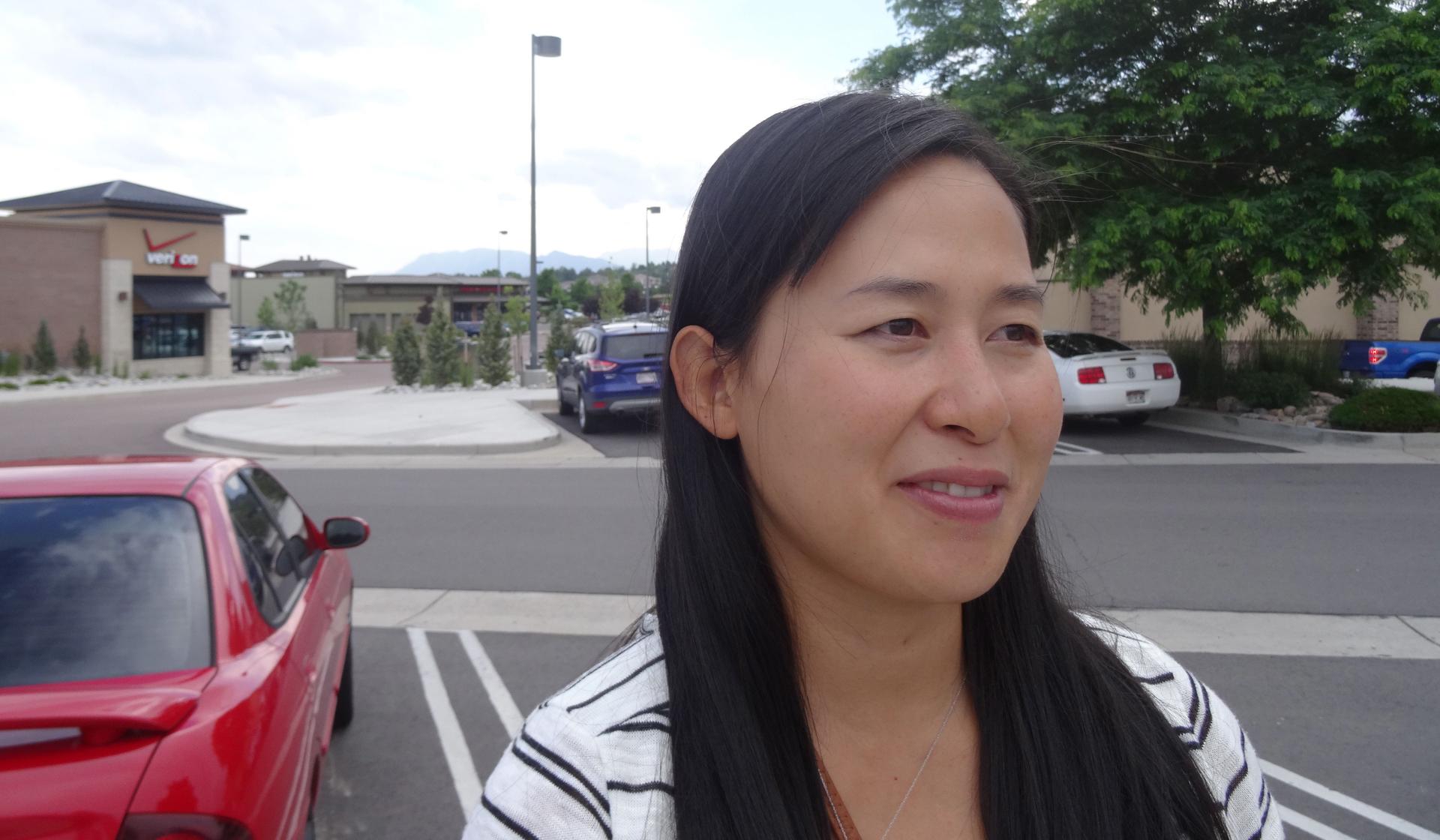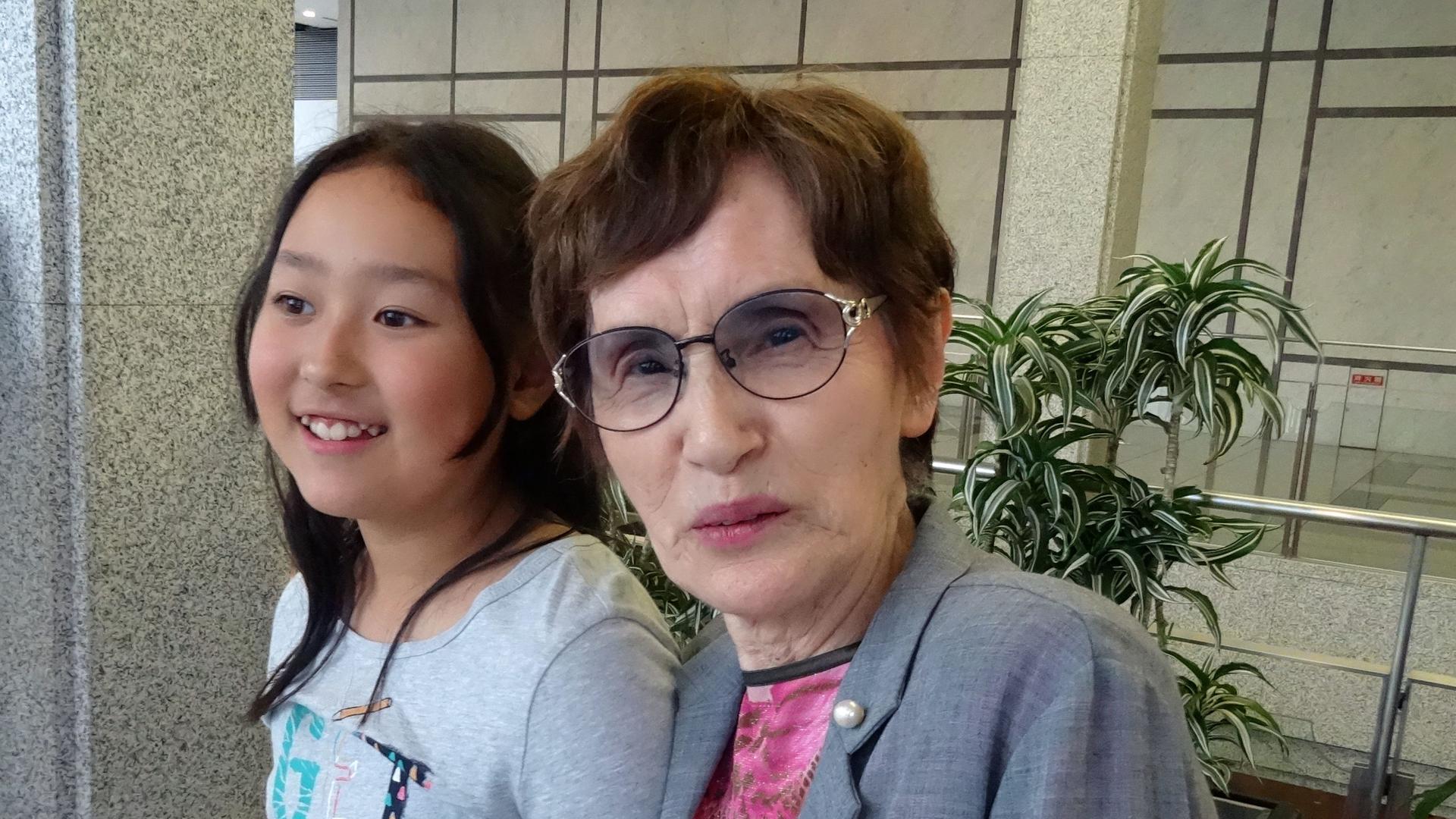Hiroshima survivor Sueko Hada and her great-granddaughter Luna.
I first met Sueko Hada 10 years ago, just before the 60th anniversary of Hiroshima.
She told me then what happened to her on the morning of August 6, 1945. Her parents had already left for work, leaving breakfast for her and her four sisters. Suddenly, there was a flash of light and a huge explosion, followed by silence.
When the family home collapsed, her badly injured sisters were trapped in the rubble. Alone among the sisters, Hada was able to free herself. She left the house to look for help.
“When I went outside I saw that everything had totally changed,” Hada told me. “It looked like twilight. Everyone was injured. I myself was bleeding from a neck wound — there was blood all over the white clothes I was wearing.
“I wanted to return to the house, but I got lost — the landscape had changed. I didn’t know which way to go. The only thing I could do was follow the other injured people.
“Still to this day, my sisters’ voices haunt me. I can hear them saying ‘Please call for help!’ That’s the most painful thing — that I ran away from my sisters. I’ve felt guilty about this since that day. I’ll feel guilty as long as I live.”
Hada never saw her sisters or parents again.
She told me many other terrible things that befell her, or that she witnessed, in the days and years after the blast. At times, she went into graphic detail — of deaths that she witnessed, from burns or radiation sickness. Quick deaths, slow deaths.
She also spoke of her own subsequent unhappy upbringing by relatives who scolded her when she cried, telling her she was the lucky one to have survived.
Earlier this summer in Hiroshima, I met the family again — all except one of the granddaughters, of whom more later.
Sueko Hada's family
Listening to Hada that day 10 years ago were her daughter and two granddaughters. Her granddaughter Yoshiko brought her baby girl, Luna, with her.

Since 2005, Hada told me she has become used to telling her story publicly — usually on a stage in front of hundreds of people. Like many Hiroshima survivors she has in her later years broken her silence. She is driven by a mission to relate her experience. She knows that it is a powerful story, best told by her.
“Sometimes a memory comes to me out of the blue, right while I’m telling my story,” she says. “I catch my breath: ‘Oh! That happened!’ I tell myself. And I make a note of it so I can include it next time I speak.”
Speaking in the United States
Four years ago, Hada visited the United States and spoke to audiences in Washington, Boston and elsewhere. “Americans listened intently to what I had to say.” she says. “One time, a young person approached me, saying ‘I’m sorry,’ and gave me a hug. I was very moved.”
“I thought these Americans were good people — and it was only the war that made our nations fight each other.”
It’s never easy for her to tell her story, whether to Americans or Japanese. But speaking to strangers is manageable — a million miles from the intimacy of a one-on-one conversation with a family member. “When my daughter and I talk about it, we tend to be too shy to talk frankly,” she says. “It’s only in the last year or two that she has started asking questions about my experience.”
With her own daughter sitting just a few feet away, Hada tells me how a part of her would like her daughter to become a “memory keeper.” These are second- and third-generation survivors who tell the story of their older relative once that relative no longer can. More memory keepers are needed; Hiroshima’s authorities are trying to recruit new ones. But Hada feels a strong counter-urge, too: to shield her daughter from the pain that she herself has suffered. She is torn.
A granddaughter's story
I ask her about the granddaughter who isn’t in the room this time, Yuko. This is what happened to her.
Not long after I first met the family 10 years ago, Yuko went to a party thrown by a friend of hers — a friend who was married to an American. The Iwakuni Marine Corps Air Station is close to Hiroshima.
At the party, Yuko met a US Marine. They dated, got married, and after a few years, moved to the United States.
“At first, I thought, ‘Why does it have to be an American guy?”’ says Hada. “But now I think it’s a good thing. I hope that Yuko will become a bridge between Japan and the US.
“She’s not the social type but she’s trying so hard to communicate with Americans, and to fit in. I’ve seen a video of her trying to do that at a party. It makes me think that one day, I could go to one of those parties at her house and speak to the people there — as the grandma of Yuko. Instead of making a speech to strangers from a stage, I could just tell my story to them.”
I went to visit Yuko in Colorado Springs where she now lives.

“When I moved to America, I felt so guilty, so guilty,” she told me.
She talks regularly with her grandmother. She calls herself “mini grandma.”
“Her character and my character is exactly the same,” Yuko says. “She thinks that way, I think that way. Sometimes good, sometimes not good.”
Yuko was close to her grandfather, too. He was still alive when she and her American boyfriend Nick decided to get married. She was worried about telling her grandfather — he was a bit of a throwback. During World War II, he’d trained as a kamikaze pilot.
“He hated America,” Yuko says. “He didn’t want to do any American things. But we had to visit him.”
When Yuko and Nick did tell him of their plans, it went OK. They avoided serious subjects and kept things jokey. That’s how her husband is, Yuko says, a joker. Which, given the circumstances, isn’t bad.
But she says he’s reluctant to talk with her about her grandmother’s story.
“He knows the story but he never speaks about it,” she says. “I would love to know what he’s thinking inside.”
Not surprisingly, he didn’t want to speak with me either.
Yuko Arnold — that’s her name now — says she feels happy and settled with Nick. They have two young children. She says, in time, she will tell them all about their great grandmother and the atomic bomb. It’ll have to be her, she says, because they won’t learn much about it in American schools.
That episode in history — the world’s first nuclear attack — does come up in conversations that Yuko has with American friends, but only when they ask her where in Japan she’s from. When she says, Hiroshima, “Everybody says, ‘Oh, atomic bomb!’"
“That’s it.” she says. End of conversation. “It’s like [Americans] just don’t care,” Yuko says. “There’s just no point in talking, because they don’t want to dig in that history.”
At times like that, Yuko feels like giving up. But then she reminds herself of her grandmother’s courage in speaking out, even when it felt easier to say nothing. She knows she must persevere. She is, after all, the granddaughter of an atomic bomb survivor and she is living in America.
“Hopefully I can speak up one day,” she says. “Because I’m here.”
A dream
As well as the family they share, Yuko has her American family now. And Sueko Hada has the memory of her first family, the family that vanished in 1945.
Earlier this summer, she started dreaming of her father, for the first time. “I was a daddy’s girl 70 years ago,” she says. “My father would take me everywhere.”
It was that memory of him that has been showing up in her dreams. “He hugged me, and I said to him: ‘Oh Daddy, I’ve been looking for you, where were you?’ And finally I could cry, in his arms.”
Hada said she woke up crying after the first dream of her father. But she was full of joy, too.
Hada wonders why her father has appeared to her after all these years. Does he want to tell her something?
Friends tell her that maybe he’s cheering her on because he knows how hard it has been for her to speak publicly — to convey to other people what it was like to live through such an ordeal.
Hada thinks it must be something like that. Mainly, though, she’s just happy to finally see her father again.
oembed://https%3A//www.youtube.com/watch%3Fv%3Dan1AbhBrR74%26feature%3Dyoutu.be
This is the second in a series of reports supported by the United States-Japan Foundation.
